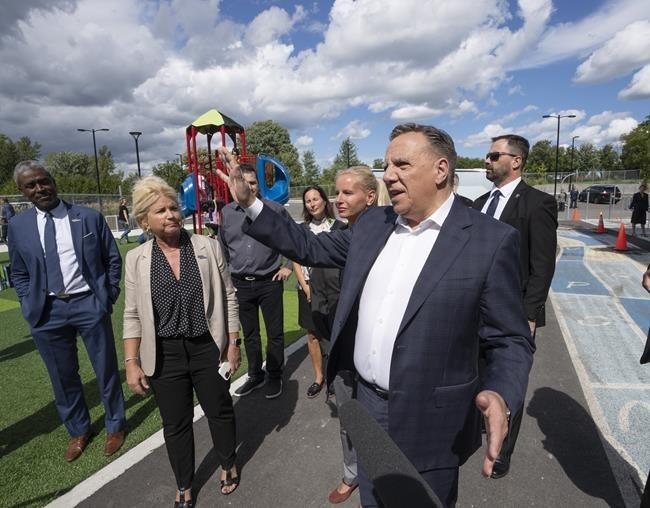MONTREAL — The Coalition Avenir Québec has decided to play the short game when it comes to election health-care promises, insisting it's important to make commitments it can keep.
On Day 5 of Quebec's election campaign, CAQ Leader François Legault promised an additional $400 million to recruit 660 doctors and 5,000 health professionals if he's re-elected premier. He also blamed the COVID-19 pandemic for his failure to implement last election's health-care promises — such as ensuring all Quebecers have access to a family doctor.
"It's only normal that with the pandemic we weren't able to do what we would have if there hadn't been COVID, and I think everyone understands that," he told reporters Thursday in Trois-Rivières, Que.
"It's not unique to Quebec. We see that in other provinces and other countries."
He was joined by several candidates including outgoing Health Minister Christian Dubé, who said the party is avoiding making false promises on health care to voters. Dubé says Quebecers have become jaded from politicians who have made big health-care commitments and failed to follow through.
"In health care, there have been a lot of promises that have been made that were not achieved," said Dubé, who announced a health reform action plan earlier this year.
One of the keys to that plan is labour, and he said the CAQ will intensify efforts to counter the shortage of health workers by winning them over with small successes that will help bring workers back. He said the goal is to make the public system the first choice for health workers.
There are 11,000 positions unfilled in the public health-care network, but the CAQ says it will hire 27,000 people over the next four years to address retirements and departures.
"There's no magic solution, but if Quebecers, the patients and health employees see small successes, these successes bring about others that will permit us to bring people back," Dubé said.
Olivier Jacques, a professor at Université du Québec à Montréal's school of public health, said the CAQ's strategy is to undersell its health-care promises. "It's interesting that he (Dubé) said this because it is true that you can't deceive the electorate by promising things that are impossible."
The CAQ, for instance promised every Quebecer a family doctor in 2018 — yet 800,000 people remain on wait lists. "I believe it's one of the (CAQ) promises that was broken that people will remember the most," Jacques said.
The Liberals have taken the opposite approach this election, promising a family doctor for every Quebecer.
A key part of the CAQ plan involves decentralizing decision-making, Jacques said, adding that to try and reform the health system quickly won't work. The best way to affect change, he said, is to tackle the problems piece by piece.
"There's no other way proceed otherwise, sadly," Jacques said.
Meanwhile, Québec solidaire on Thursday reiterated its promise to offer universal public dental insurance.
In New Richmond, Que., party spokesman Gabriel Nadeau-Dubois said the plan would cover all dental care costs for people under 18, for social assistance recipients and for seniors receiving the federal Guaranteed Income Supplement. Those who fall outside those categories could be reimbursed up to 80 per cent of teeth-cleaning costs and 60 per cent for other services such as fillings and root canals.
In Sherbrooke, Que., Liberal Leader Dominique Anglade announced plans to eliminate the province's land transfer tax — also known as the welcome tax — for those buying a first home.
Parti Québécois Leader Paul St-Pierre Plamondon was in Ottawa to sharpen his message on the need for Quebec independence. Standing outside Parliament, St-Pierre Plamondon enumerated the failures of the Legault government's negotiations with the federal government, on issues such as health transfers and immigration.
It's not the first time the PQ campaign has ended up in Ottawa: in 2018, then-leader Jean-François Lisée delivered a similar message in that city.
This report by The Canadian Press was first published Sept. 1, 2022.
Sidhartha Banerjee, The Canadian Press



